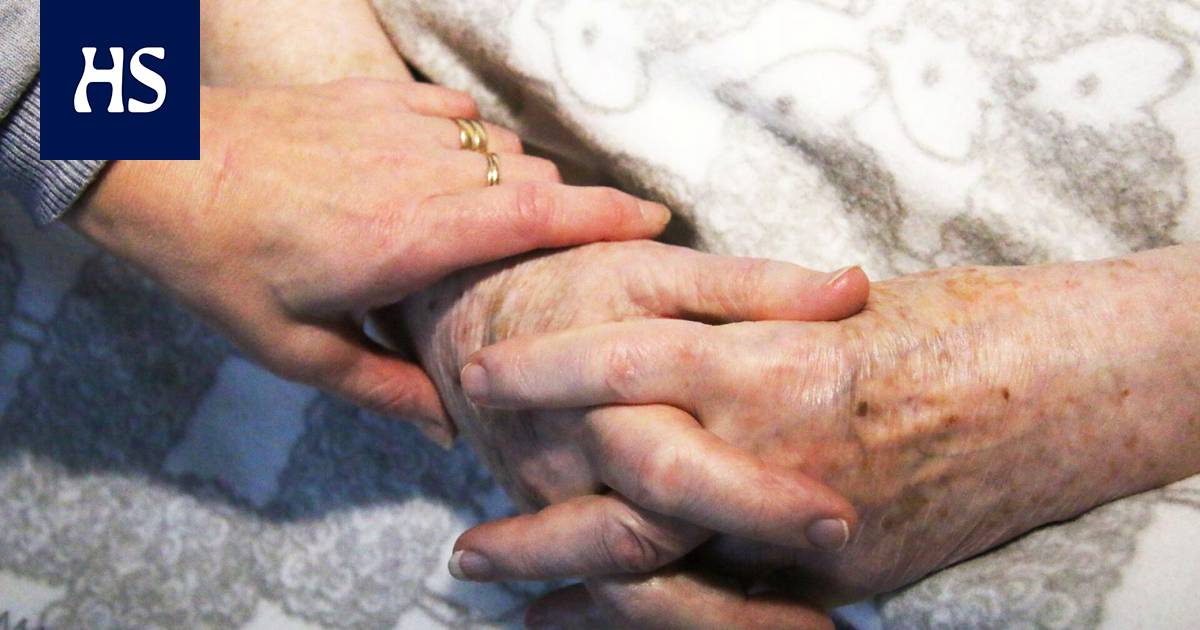Doctor Anja Lappalainen fought with the nursing home for a long time to get her over 90-year-old mother-in-law off the medicine that stiffened her.
Retired being a doctor Anja Lappalainen wondering what he could have done differently. How could her mother-in-law’s use of the psychiatric medication, which caused unpleasant side effects, be stopped faster in the nursing home?
The hip fracture of the 93-year-old mother-in-law was operated on at the end of 2019 at Jorvi Hospital in Espoo. Anesthesia and painkillers caused confusion in the elderly patient. For that, the hospital doctor prescribed the psychiatric drug Risperdal, which Lappalainen also thought was necessary in that situation.
Anja Lappalainen is a specialist in general medicine who worked for 30 years in a health center. Now he has been retired for five years.
Medicine giving to the mother-in-law continued in the Sammalkallio nursing home in Espoo, where she was moved to live in March 2020, three months after the operation. At the same time, the first hard corona restrictions began.
“My husband’s mother suddenly started to become rigid and expressionless. He could no longer raise his hand to wave,” says Lappalainen.
“I recognized the side effects of the drug right away, after all, risperidone is such a common drug. In old people, it may accumulate, i.e. the effect may be doubled.”
According to Lappalainen, the effect of the drug can be repeated easily in old people if they, for example, do not drink enough.
“
“It wasn’t enough that I assured that my mother-in-law had never been restless before the hip surgery, and especially not in need of antipsychotic medication.”
Lapp tried to explain the matter several times to the nurse in charge of the nursing home, but she did not understand the matter.
Husband Pekka Lappalainen was told repeatedly that his elderly mother’s condition was due to advancing dementia – that “it’s going away now”.
Anja Lappalainen says that she is well aware that dementia is a progressive disease. Still, the effect of the medicine was obvious in his eyes.
“My words were not enough. It wasn’t enough that I assured that my mother-in-law had never been restless before the hip surgery, and especially not in need of antipsychotic medication.”
Corona time started in the spring of 2020, and the Lappalaisen could only meet Pekka Lappalainen’s mother through the glass.
“He was like a statue. Over the course of two months, I asked for the medication to be reduced at least five times, and the nurse in charge promised to pass the information on to the doctor,” says Anja Lappalainen.
According to him, the relatives had been told that no information could be given about the resident’s medication list. However, the man was his mother’s guardian and received information about the medication from the pharmacy along with the bill.
“The doctor did not answer the call request. According to the pharmacy bill, the psychiatric medication was still in use.”
The people of Lapland no longer kept copies of electronic invoices, so HS has not seen invoices or prescriptions.
Read more: Nursing home residents began to gain weight up to ten kilos a year – The reports paint a gloomy picture of care for the elderly
I attend director of services for the elderly Esko Sutelainen answers questions about the elderly living in a nursing home at a general level.
“When a loved one’s mind is weighed down by worry, every moment and day is too much in uncertainty. If a loved one feels that things are not progressing, we encourage you to contact not only the caregiver and the manager of the Attendo home, but also the regional manager and the regional manager of Attendo, if necessary.”
However, according to Sutelainen, decisions about medical treatment and contact with loved ones are always made by the doctor in the welfare area.
When After many attempts, Lappalainen got in touch with the nursing home’s doctor, who reduced the amount of the psychotropic medication.
In the end, the situation broke out unexpectedly. The nurse in charge changed, and the medicine was completely removed from the mother-in-law.
“After that, there were no difficulties in getting medication information from the nursing home either. The new responsible nurse was really professional.”
I attend According to Esko Sutelainen, the doctors in the welfare area are always responsible for the residents’ medication.
When a resident moves to a nursing home, their medication is not stopped immediately, but only after the doctor has monitored the resident’s condition for some time. The first care meeting with the relatives is usually one month after the resident moves to the nursing home.
“We discuss medical treatment with the residents’ relatives, if we have permission to do so. For example, some guardianship agreements only cover financial matters, some also health care-related matters. We respect the residents’ right to self-determination and only share information with the persons named by the resident.”
“
“Always an elderly person does not want his adult daughter or son to know in detail about his psychiatric medication.”
Sutelainen admits that, in practice, information about the medication passes via pharmacy receipts also to a loved one who has a financial guardianship authorization.
“Thus, whenever possible, we also discuss medical treatment with loved ones in the treatment meeting, if a loved one has a concern about it and asks about it.”
According to Sutelainen, situations require sensitivity.
“We want loved ones to support the resident’s well-being and independent life as much as possible. At the same time, we hold on to the right to self-determination. An elderly person does not always want his adult daughter or son to know in detail about his psychiatric medication.”
When the medicine had been removed, the mother-in-law was her former self. He underwent cataract surgery, chose new glasses himself and also got new false teeth.
“His 95th birthday was celebrated at the nursing home. He was so energetic that we thought he would live to be a hundred years old,” Anja Lappalainen recalls.
However, the elderly mother-in-law contracted the coronavirus and died of the disease within four days.
#Health #drug #prescribed #motherinlaw #turned #statue #Doctor #Anja #Savolainen #monthslong #battle #nursing #home









